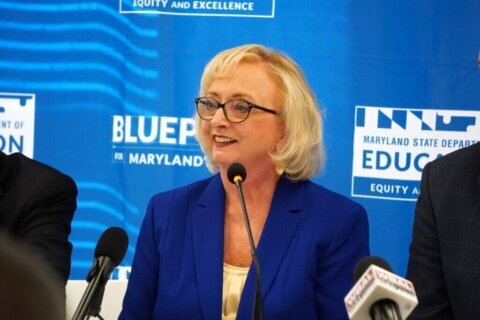ANNAPOLIS, Md. (AP) — Despite recent fiscal challenges, Gov. Wes Moore’s $63 billion budget plan remains largely intact under legislation approved unanimously Thursday in the Maryland Senate.
The measure makes reserves available if needed to cover a miscalculation in Medicaid costs that was discovered after the governor submitted his budget to the General Assembly in January.
The legislation now goes to the Maryland House, where majority Democrats haven’t been shy in voicing support to raise significant revenues this year to help address deficits in future years, pay for a major K-12 education funding overhaul and fund ambitious plans to fight climate change.
But leaders in the Senate, which also is controlled by Democrats, have said major tax increases are a nonstarter this session. And the governor — who highlighted the lack of tax increases in his budget — has said there would be “a very high bar” for tax hikes.
It’s a revenue debate playing out in an election year for an open U.S. Senate seat and congressional races, featuring the surprise U.S. Senate candidacy of former Republican Gov. Larry Hogan, who campaigned against tax increases to win his first term in 2014 in the heavily Democratic state and won re-election in 2018.
Moore’s proposed budget is more than $1 billion smaller than the last one, due to the absence of federal aid that Maryland, like other states, had received during the COVID-19 pandemic. Still, a large amount of reserves that lawmakers set aside can be tapped to address future holes.
In addition to the budget bill, the Senate voted 43-3 to approve a separate measure that is working in tandem to balance the budget.
In its work on the spending plan, the Senate had to address a drop in forecasted revenues announced last week for the current fiscal year as well as the next, totaling $255 million. The mistake in the state’s Medicaid calculations presented another $236 million challenge.
The Senate decided to authorize the governor to withdraw money from the rainy day fund to ensure Medicaid and foster care are adequately funded.
The budget fully funds the state’s ambitious K-12 spending plan known as the Blueprint for Maryland’s Future, while challenges remain on how to pay for rising future costs as it is phased in.
Senators also kept Moore’s down payment of $90 million to help reach the state’s ambitious goal to reduce greenhouse gas emissions, though it’s only a one-time expenditure. The money would be used to lease electric school buses, install electric vehicle charging infrastructure and electrify schools and multifamily homes.
The Senate also restored some funding Moore proposed reducing for community and private colleges, a move that brought students to Annapolis to lobby lawmakers.
While the Senate hasn’t entertained the kind of revenue increases under consideration in the House, it is considering measures to help raise money for the state’s medical trauma system. For example, the Senate is advancing a bill to increase the annual surcharge on vehicle registration fees that support emergency medical services.
Senators also are moving forward with a new tax on firearms and ammunition in a separate measure, and they are considering a surcharge for electric vehicle registration fees to help make up for gas taxes that their owners don’t pay.
Meanwhile, the House appears poised to advance legislation to allow internet gambling, an expansion beyond the state’s brick-and-mortar casinos. There’s a similar bill in the Senate, but it’s unclear how much support exists for more gambling, which would need to go on the ballot for voter approval if a bill clears the General Assembly.
The budget, as modified by the Senate, preserves about $1.3 billion in the rainy day fund, which is about 9.4% of general fund revenues. That’s well above the 5% that the state routinely kept in the fund before the pandemic.
The House will work on the budget legislation with less than a month to go in the 90-day legislative session. Differences between the two chambers will have to be resolved before the General Assembly adjourns at midnight April 8.
Copyright © 2024 The Associated Press. All rights reserved. This material may not be published, broadcast, written or redistributed.







